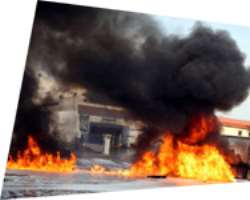Playing with petrol tanker fire – Punch

A week into the New Year, it is obvious that the deluge of fire disasters that cost the nation about N50 billion in 2013 (according to the Federal Ministry of Internal Affairs) is yet to abate. Last Tuesday, a scorching fire incident that claimed 15 lives, destroyed 50 shops, a bank and 20 cars, tore through the heart of Apapa, Lagos. Residents and owners of businesses in the area, which is a host to the major ports, are still mourning, and counting their losses. The tragedy, caused by a rickety tanker laden with 33,000 litres of petrol that crashed after it lost control at a pothole-ridden section of the road, was, however, avoidable, which makes it all the more lamentable.
There are many issues involved in the tragedy, which need to be addressed urgently to avoid a recurrence. One is the ineptitude of the Federal Government in providing and maintaining critical national road infrastructure. Others are the inability of the government to see policies to their logical conclusion; the bottleneck caused by the unbridled importation of petroleum products that makes tankers from all over Nigeria converge on Apapa to lift fuel; the inability to enforce extant traffic laws and an obsolete transport system that relies mainly on a decrepit road network. It makes better economic sense and safer to transport petroleum products by pipelines.
Although the Federal Government collects diverse taxes amounting to over N2 trillion annually from the ports, the Apapa-Oshodi Expressway that leads to the business gateway has deteriorated significantly for more than 20 years because of neglect. Filled with giant potholes that make driving a hell, the road is a terrible advertisement of our values as a nation: it shows we have visionless, clueless and inept people at the helm of affairs; administrators who bask in opulence but cannot fix roads that earn the revenues that fund their lavish lifestyle. What a contradiction.
Since Ngozi Okonjo-Iweala, the Finance Minister, carried out a half-hearted reform at the Lagos ports in late 2011 by ejecting some of the government agencies with overlapping functions, the ports have gained more notoriety as a place to do business. Although the reform worked initially, the minister abandoned it. So, business continued as usual. What a shame. Also, because our refineries are underperforming in spite of billions of dollars spent on Turn Around Maintenance, the sheer number of tankers waiting to lift imported petrol at the ports has become unmanageable. And with the Federal Road Safety Corps and Vehicle Inspection Officers abdicating their roles, looking the other way while unfit articulated vehicles ply the roads, the inferno that wreaked destruction at Kirikiri last week was, therefore, a disaster foretold.
But something must be done to end this orgy of gratuitous disasters. As Governor Babatunde Fashola of Lagos State said, the Federal Government must expediently revamp the old rail network in the ports. Lamenting that it is only in Nigeria that fuel is still being transported by tankers, the governor, whose state is bearing the brunt of the inefficiency of the whole nation added, 'The Federal Government is the first to be blamed. There is no rocket science about restoring the old rail tracks. If the rails are working as they (Federal Government officials) say, they should begin to use them to transport petroleum products, rather than use the road. It will save the roads and fuel.'
There is a lot of sense in this. Abuja should heed this wise counsel. It should revamp the old rail network, and build new rail lines from the seaports to neighbouring states to end the uneconomic venture of tankers gathering to load petroleum products in Lagos, thereby congesting the roads and making movement perilous if not almost impossible. As Fashola observed, other countries have moved on to new, efficient ways of transporting petroleum products. The Federal Government should wake up from its slumber.
Russia supplies gas to other European countries via the Trans-European Natural Gas Pipeline. The pipeline is more than 1,000 kilometres long. Germany is collaborating with Morocco to construct a pipeline from the North African country that will serve as an alternative in the event of a cut in supply from Russia. It is high time the Federal Government and the corruption-tainted Nigerian National Petroleum Corporation revived our pipeline networks in order to stop the era of tankers causing mayhem on our roads. The excuse of pipeline vandalism is trite. Which serious organisation wants to secure its future without protecting its most precious assets?
Although belligerent tanker drivers had twice gone on strike when Lagos attempted to sanitise their operations, the state should approach their issue by first launching a sustained media awareness campaign on the law that restricts tankers (and other articulated vehicles) from plying the roads between 6am and 11pm. After this, the law should be enforced and violators sanctioned. The state should do this with the collaboration of the labour unions.
The Federal Government should feel ashamed that it is just raking in money from Lagos and is indifferent to providing and maintaining the existing infrastructure there. Abuja should see it as a priority to complete the reconstruction of the Apapa-Oshodi Expressway before the middle of this year in order to save the nation the agony of needless fire disasters. More than that, the time has come for Abuja, state governments and pressure groups to push for the repeal of the Railways Act 1955 that vests the sole power to run the railways in the Federal Government. The repeal has been abandoned at the National Assembly. In its place, a private sector friendly law should be enacted.
In the face of the crisis fostered by poor local refining capacity and the fuel imports, the Federal Government should revisit the privatisation of the four public refineries with a view to selling them transparently.
